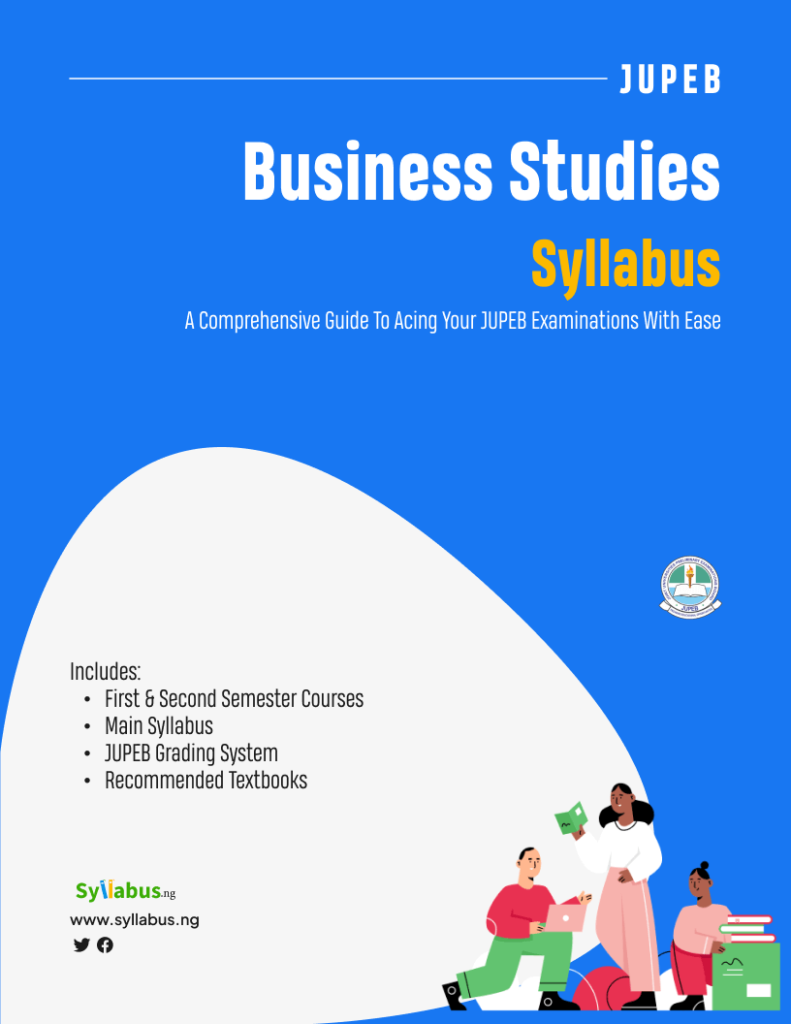JUPEB Business Studies Syllabus
Are you writing Business Studies in your upcoming JUPEB exams? Download the recommended Business Studies syllabus to excel in your exams. Take the first step in studying smart today.

Home » JUPEB Syllabus » JUPEB Business Studies SyllabusAbout JUPEB Business Studies Syllabus
Are you a JUPEB student looking for a good study material for Business studies? You are in the right place.
This JUPEB Business Studies Syllabus is a must-have as it contains the full list of topics for this particular course. With this, you can read and go into the exam hall with confidence because you know that wherever the questions come from, you have read and are fully prepared for the exams.
This syllabus, combined with your past questions is your best bet to success in your Business Studies exam. Download and start studying now.
What Course Of Study Can Choose Business Studies
With a pass in your JUPEB Business Studies exam, you are on track to getting a degree in Accounting, Economics, Business administration, or any Social Science course.
Download JUPEB Business Studies Syllabus

Best candidates don’t just study hard, they study smart
Download JUPEB Business Studies Syllabus today!
JUPEB First Semester Courses Business Studies
COURSE CODE | COURSE TITLE | CREDIT LOAD |
BUS001 | Business and it’s Environment | 3 Units |
BUS002 | Finance and Accounting | 3 Units |
JUPEB FIRST SEMESTER Business Studies SYLLABUS
| JUPEB BUSINESS STUDIES SYLLABUS | ||
| SN | TOPICS | OBJECTIVES |
| FIRST SEMESTER | ||
| BUS001: BUSINESS AND IT’S ENVIRONMENT | ||
| 1 | ENTERPRISE | i. The nature of business a) Goals of business activity; b) Concept of adding value, c) Nature of economic activity, d) Problem of choice and opportunity cost, e) Dynamic business environment, f) Needs of business to succeed, g) Many businesses ii. The role of the entrepreneur a) Qualities of an entrepreneur likely to be needed for success b) The role of business Enterprise in the development of a business and a country iii. The social enterprise a) The range and aims of social enterprises; b) Triple bottom line economic (financial); c) Social and environmental targets. |
| 2 | BUSINESS ENTERPRISE | i. Economic sector a) Primary, secondary and tertiary sector businesses; b) The public and private sectors ii. Legal structures of businesses a) Main features of different types of legal structures, b) Ability to raise finance, appropriateness of legal structure, c) Sole trader, partnership, private limited companies, public limited companies, franchises, co- operatives, public corporation, and d) Problems resulting from changing from one legal structure to another. |
| 3 | SIZE OF A BUSINESS | i. Measurement of business size a) Different measures of measuring the size of a business ii. Significance of small business a) Advantages and disadvantages of being a small business, b) Strengths and weaknesses of family businesses. c) The importance of businesses and their solein the economy, d) The role of small businesses as part of the industry structure in some industries. iii. Forms of business growth a) Why and how a business might grow iv. Local, national and multi-national businesses, privatization/nationalization a) Differences among local, national and multinational businesses; b) Merits and demerits. c) Merits/demerits of privatization/ nationalization. |
| 5 | STAKEHOLDERS IN A BUSINESS | i. Role, rights and responsibilities of stakeholders a) Groups involved in business activity; b) Roles, rights and responsibilities of stakeholders, c) Conflict resolution among stakeholders. |
| 6 | BUSINESS OBJECTIVES | i. Objectives and business decisions a) Corporate aims, corporate objectives, types of objectives, criteria for setting objectives. |
| 7 | ORGANIZATIONS | i. Organization structure a) Meaning, b) Forms of organisational structure; merits/demerits of each organisational structure. ii. Delegation of authority a) Why executives delegate; b) Reasons for delegating responsibility; c) Reasons for not delegating responsibility. iii. Centralization and decentralization a) Meaning, b) Merits and demerits of centralization |
| 8 | COMMUNICATION | i. Business communication a) Meaning, b) Purposes and methods of communication, c) Role of management in facilitating communication; d) Barriers to effective communication and solutions |
| BUS002: FINANCE AND ACCOUNTING | ||
| 9 | BUSINESS FINANCE | i. The need for business finance a) Startup capital, b) Capital for expansion, c) Working Capital; d) Significance of capital and revenue expenditure ii. Sources of finance a) Legal structure and sources of finance, b) Short term/long term finance, c) Internal/external sources, d) Factors influencing the sources of finance |
| 10 | WORKING CAPITAL MANAGEMENT | i. Forecasting of cash flows a) Difference between cash and profits; b) Cash flow forecasts in practice, c) Methods of improving forecast ii. Managing working capital a) Meaning of working capital; b) Calculation of working capital; c) Importance of working capital |
| 11 | COST | i. Types of cost a) Fixed, variable, marginal, direct and indirect; b) Uses of cost information ii. Break even analysis a) Uses and limitations of break-even analysis |
| 12 | ACCOUNTING FUNDAMENTALS | i. Income statement a) Content; b) Calculation of gross and net profit; c) Uses and ways to improve d) Profitability of a business ii. Balance sheet a) Meaning and content of balance sheet, b) Extracting balance sheet; c) Published accounts and its limitations iii. Ratio analysis a) Liquidity ratios; b) Profitability ratios; c) Shareholder ratios; d) Gearing ratio; e) Practical use of ratios analysis f) Limitations of ratio iv. Depreciation a) Meaning b) Role and calculaton |
| 13 | BUDGETING | Budgets |
JUPEB Second Semester Courses for Business Studies
COURSE CODE | COURSE TITLE | CREDIT LOAD |
BUS003 | Management I | 3 Units |
BUS004 | Management II | 3 Units |
JUPEB SECOND SEMESTER Business Studies SYLLABUS
| SECOND SEMESTER | ||
| BUS003: MANAGEMENT I | ||
| 14 | MANAGEMENT AND LEADERSHIP | i. Management ii. Leadership |
| 15 | MOTIVATION | Theories of motivation |
| 16 | HUMAN RESOURCE MANAGEMENT (HRM) | Scope of HRM |
| 17 | MARKETING | i. Marketing ii. Markets iii. Market research |
| BUS004: MANAGEMENT II | ||
| 18 | OPERATIONS | i. Nature of Operations ii. Operation planning iii. Inventory management |
| 19 | STRATEGIC MANAGEMENT | i. Strategic management ii. Strategic analysis iii. Strategic choice iv. Strategic implementation |
Recommended JUPEB Business Studies Textbooks
BUS 001: Business and Its Environment
1. Eric C. Eboh & Jones I. Lemchi (2010). Business Environment in Nigeria States 2010: Tackling the Security Challenges.
2. Sunday A. Enikanselu & Ayodele 1. Oyende (2009). Environment of Business in Nigeria.
BUS 002: Finance and Accounting
1. Robert O. Igben (2009). Financial Accounting 2; 3rd edition. Made Simple Vol.
2. Robert O. Igben (2014). Financial. 1; 4th edition. Accounting Made Simple. Vol.
3. Chinonye L. Emmanuel (2003). Fundamentals of Accounting. 4. Sunday I. Owualah (2010). Principles of Financial Management.
5. Eddy O. Omolehinwa (2014). Foundation of Accounting: An IFRS Approach.
6. Ishola, K.A. (2012). Foundation in Accounting for Tertiary Institutions [In compliance with the requirements for International Financial Reporting. Standards (IFRS)].
BUS 003 & 004 Management I & II
1. Aromoláran, E.A. (2010) Fundamentals of Management (3rd edition). Lagos: Holy Production Ltd.
2. Ayodele A.D. & Stephen O.O. (2009). Introduction to Business Cole, G.A. (2000). Management, Theory and Practice (6th edition). London: DP Publications.
3. Fela Odueyungbo (2009). Business Management: A Practical Approach.
4. Joseph O. Ojenike (2006). Principles and Contemporary Issues
5. Joseph O. Ojenike (2006) Principles and contemporary issues in Management.
6. Feter F. Ducker (2007). The Practice of Management.
7. Yalokwu, P.O. (2006) Fundamentals of Management (2nd edition).
8. Owolabi Kuye (2004). Management Concepts and Process: An Expository Approach.
Download JUPEB Business Studies Syllabus

Best candidates don’t just study hard, they study smart
Download JUPEB Business Studies Syllabus today!
All JUPEB Subject & Syllabus
NOTE: Candidates are required to write 3 subjects in the qualifying examination)
JUPEB currently offers examinations in the following nineteen (19) subjects as detailed in its syllabuses. The subjects can be classified into 3 categories: Arts & Humanities, Management & Social Science and Sciences
Arts and Humanities
Management & Social Sciences
Frequently Asked Questions About JUPEB Business Studies
The JUPEB Business Studies exam usually lasts for 3 hours. 1 hour for the objective section and 2 hours for the theory section.
The exam will consist of 50 multiple-choice/objective questions, and 8 essay-type questions for you to answer 4.
The syllabus covers a wide range of topics, including budgeting, business organizations, marketing, human resource management, etc
To prepare effectively, we would advise you to study the syllabus thoroughly, find and practice past questions, participate in group discussions, and seek clarification on topics you don’t understand from your lecturers.
Yes, a full list of recommended textbooks is listed above.
Some tips include understanding the topics in the syllabus, reading and understanding instructions on the exam day, practicing time management before exams, and being as detailed as possible when answering theory questions.
The JUPEB Business Studies exam is important if you are seeking admission into universities through the JUPEB program. It contributes to the overall assessment of your academic abilities and is your ticket to moving on to the 200 level in university.












